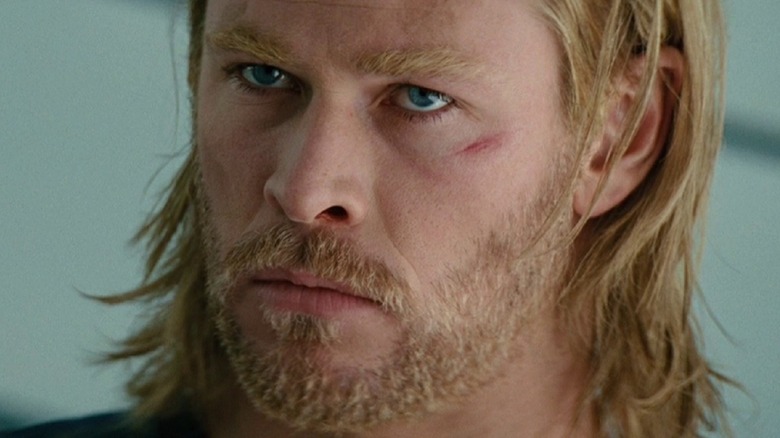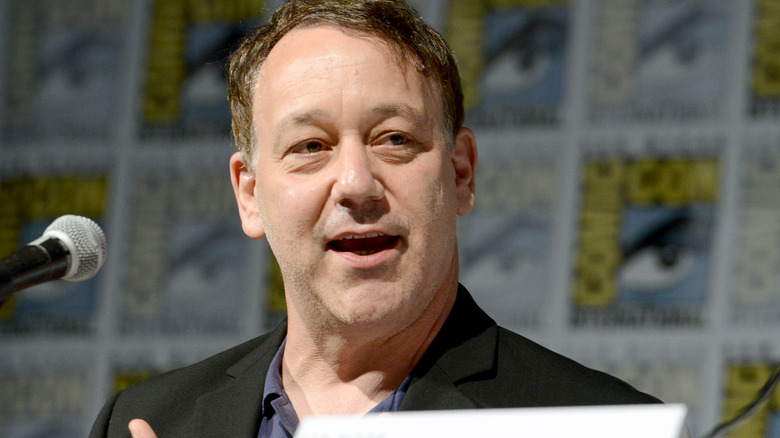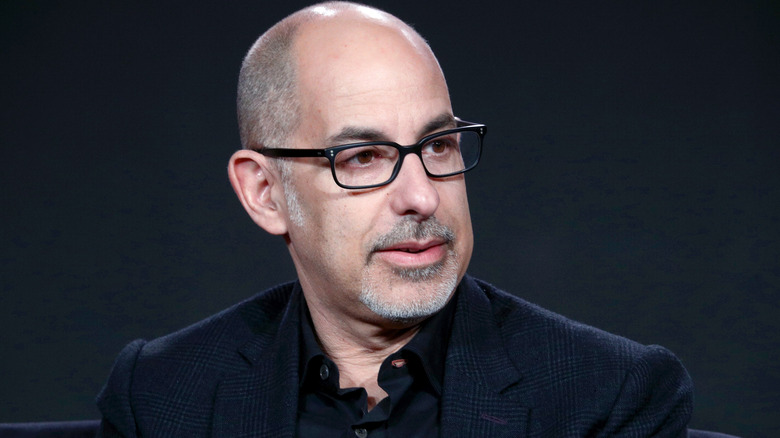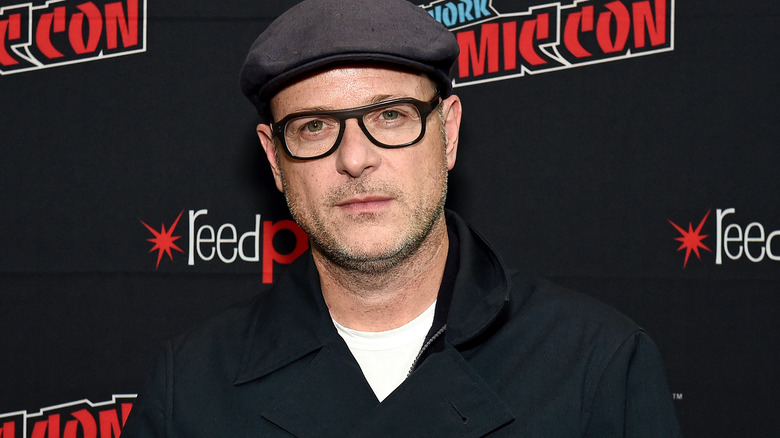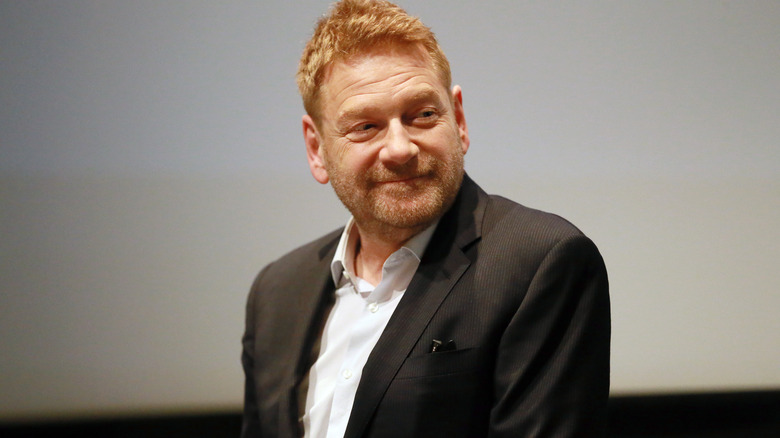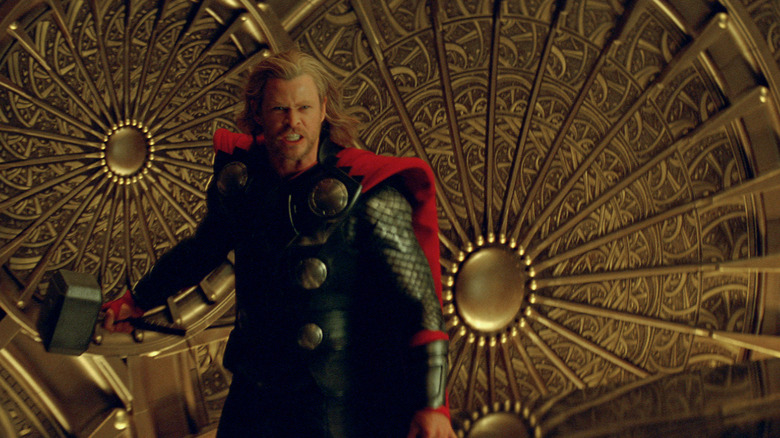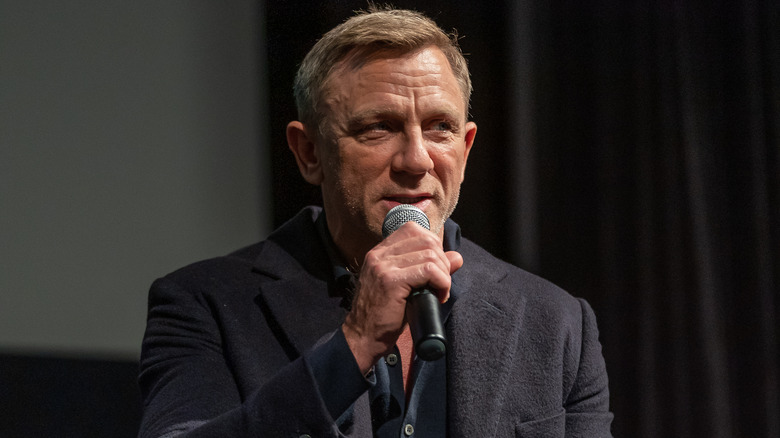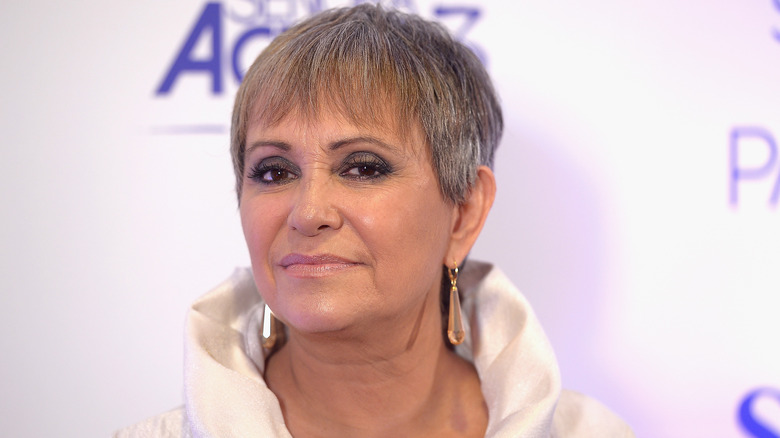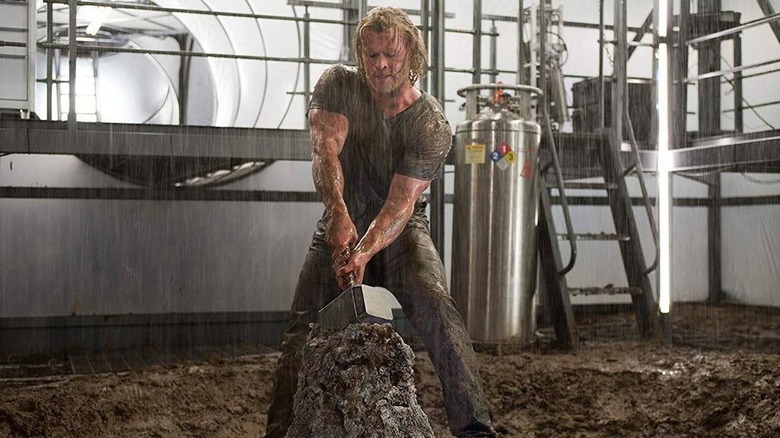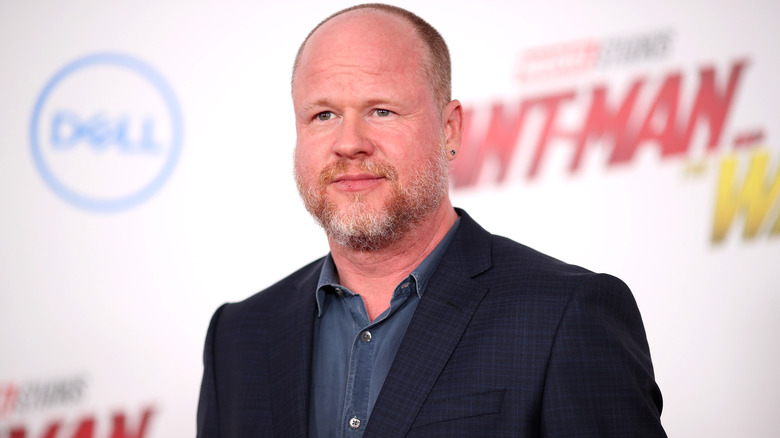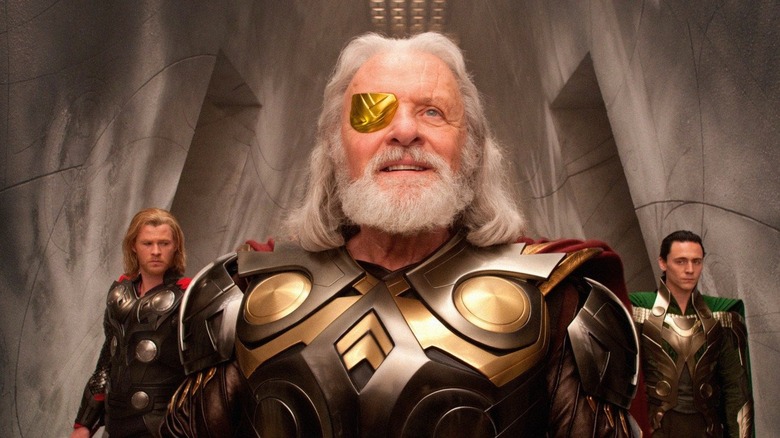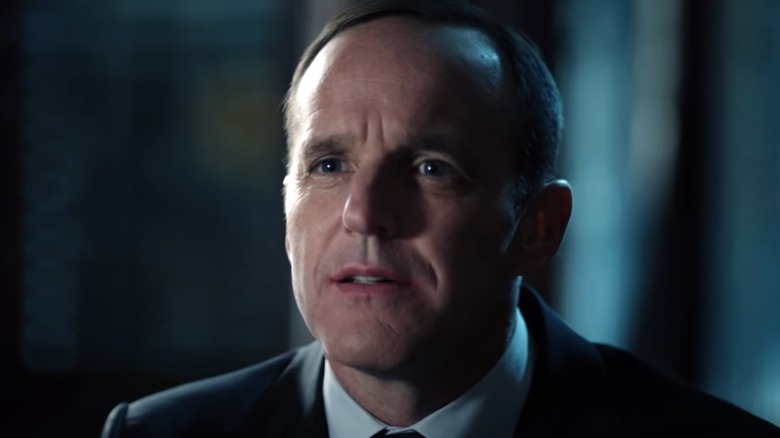Things You Never Knew About 2011's Thor
In the most recent installments of the Marvel Cinematic Universe, Thor has become one of the most distinct and entertaining figures in the entire franchise. Thanks to Taika Waititi's rollicking cosmic comedy "Thor: Ragnarok," Thor is now an ultra-powerful and ultra-funny version of the God of Thunder, one who constantly subverts expectations, particularly with just how human this deity can be. Considering how memorable this version of the character is, it can be easy to forget that Thor existed for quite a while before "Ragnarok" and the two most recent "Avengers" movies.
Thor got his start in the Marvel Cinematic Universe all the way back in May 2011, with his first solo movie directed by Kenneth Branagh. A decade after its release, "Thor" is considered one of the more mediocre MCU installments, but it still remains a pivotal title in the franchise. After all, it introduced MCU staples like Loki while also being the first time this series dabbled in fantasy storytelling. Plus, as the history of "Thor" indicates, there are lots of unspoken and interesting facts about this movie. Though they range from alternate directing choices to notable box office achievements, all these elements reinforce how "Thor" is far from a disposable part of the MCU.
Sam Raimi wanted to do a Thor movie
Everyone knows that Sam Raimi directed a trio of "Spider-Man" movies in the 2000s, and it's already known that he's helming the upcoming "Doctor Strange in the Multiverse of Madness" for Marvel Studios. But long before those projects came around, Raimi's first interest in a big-budget Marvel property came in the early '90s, when he pursued a live-action "Thor" movie.
Raimi pitched a "Thor" film to 20th Century Fox in the 1990s alongside comic book legend Stan Lee, which, despite having that serious star power on his side, didn't go well. "It was thrilling to be with Stan Lee and hysterical the way that we had to explain who Thor was to executives," Raimi reflected (via Variety), "walking out of there going, 'We didn't get it! They think it's gonna be some Hercules movie or something!'" Studio executives just couldn't buy a fantasy superhero working out on the big screen then. Raimi would get the last laugh, though, once he directed a series of successful superhero movies over a decade later, while the character of Thor would also manage to eventually secure a long-term career as a big-screen icon.
David S. Goyer was once attached to write and direct
As a notable name in Hollywood, David S. Goyer has had his hands on countless comic properties — some better than others. For example, he directed "Blade: Trinity," served as a writer on Christopher Nolan's "Dark Knight" movies, and worked on the script for "Man of Steel." Given his prominence in this field, it shouldn't be a surprise that he was once attached to direct a version of a live-action "Thor" movie.
At the end of 2004, it was revealed by producer Avi Arad that Goyer was set to handle "Thor" for Sony Pictures. "'Thor' is being written now," Araid said (via IGN). "Actually, David is going to write it. He is a Thor fanatic for a long time." This was coming shortly after his tenure helming "Blade: Trinity," which put him in a cozy spot in the Marvel family. However, this directorial choice wasn't meant to last. By the time the summer of 2005 arrived, Goyer was off the project, and "Thor" was in need of a new filmmaker. Goyer's name was briefly connected to "Thor" once again in the summer of 2006 ... but this didn't last long either.
The Matthew Vaughn iteration of Thor
Matthew Vaughn hasn't had the best track record with directing Marvel movies. Famously, Vaughn was assigned to direct "X-Men: The Last Stand" before getting thrown off the project in pre-production. Even after helming "X-Men: First Class," he walked away from the film's sequel, "Days of Future Past." Another Vaughn Marvel movie that was never meant to be was the filmmaker's take on the "Thor" mythos.
In early 2008, Vaughn was attached to direct "Thor" for Marvel Studios and already had a specific creative vision for the film. "I think you have to respect that it is comic book and silly to be frank," Vaughn explained to Empire. "So you have to combine that with a modern style and hopefully come up with something fresh. I think we can come up with something special." But a few months later, Vaughn departed the film due to budgetary constraints. "The only problem is that it has been costed at $300m, and they ask how I am going to reduce it by $150m," Vaughn said (via Slash Film).
With that, the filmmaker departed the project and Marvel Studios returned to searching out a director to handle the first live-action "Thor" movie. Of course, things all worked out for Vaughn, as he found comic book success by adapting "Kick-Ass" and "Kingsman."
The other lost directors of Thor
With initial director Matthew Vaughn no longer a part of "Thor," Marvel Studios was on the hunt for a new filmmaker to tackle the God of Thunder's first live-action movie. This search eventually turned up D.J. Caruso, then the director of back-to-back mid-budget hits "Disturbia" and "Eagle Eye." Caruso expressed interest in helming the project in September 2008 and said that he'd engaged in discussions with Marvel Studios about the endeavor. However, this never came to pass, with there being no further developments on Caruso's connection to this production beyond this one report.
Another director Marvel approached for the film was Guillermo del Toro. According to the Oscar-winning filmmaker himself (via MTV News), "They approached me for 'Thor.' And for a long time we talked about that, because the mythology and the images were very attractive to me." He also expressed fondness for the elements that made him gravitate towards the production in the first place. "I'm a fan of [Jack] Kirby and the power he has, and I'm a fan of the original mythology," reflected del Toro. "So I thought we could go back to the original mythology a lot. I love Loki, I think he's a great figure." Del Toro's extensive experience with fantasy cinema makes him seem like, on paper, an ideal choice to helm a "Thor" movie.
Despite both demonstrating enthusiasm for "Thor," neither Caruso nor del Toro would end up sitting in the directors chair of the fourth Marvel Cinematic Universe movie.
Why did Kenneth Branagh take on the project?
Most of the original MCU directors had some sort of experience when it came to mainstream genre movies. "The Incredible Hulk" director Louis Leterrier had done the "Transporter" movies, for example, while "Captain America: The First Avenger" helmer Joe Johnston had a storied history in this domain thanks to films like "The Rocketeer." But "Thor" director Kenneth Branagh was a horse of a different color thanks to his experience helming Shakespeare adaptations and other prestige dramas.
What drew Branagh to take on such a stark departure from his normal work? Right after he first got the gig, Branagh explained to MTV News that he wanted "to work on a story about one of the immortals, gods, extraordinary beings, inter-dimensional creatures. There's science fiction and science fact and fantasy all woven into one. It's based on Norse legends which Marvel sort of raided in a brilliant way. ... It's a chance to tell a big story on a big scale. It's a human story right in the center of a big epic scenario."
With these qualities in place, Branagh's interest in "Thor" was solidified, and the filmmaker was officially on board to direct his first major blockbuster. And it would actually kick off a whole new career for the director, as he would go on to helm projects like "Cinderella," "Jack Ryan: Shadow Recruit," and "Murder on the Orient Express."
There was a whole lot of release date drama
In the wake of the enormous success of "Iron Man" at the box office, Marvel Studios set a slew of release dates for future entries in the Marvel Cinematic Universe. This included a pair of 2010 movies, the first of which was "Iron Man 2," and the other was "Thor," then set for a June 4, 2010 date. This meant the Asgardian would arrive just 25 months after the original "Iron Man" and before "The Avengers" hit theaters in its initial July 2011 date.
However, this date would soon change, as "Thor" was then shifted to a June 17, 2011 date, a whole year after its initial planned release date. Thor would once again get adjusted shortly thereafter when it was pushed forward to May 20, 2011 to ensure there was enough distance between the film and the other big MCU title of summer 2011, "Captain America: The First Avenger."
Having already gone through a trio of release dates, you'd assume the movie's journey across the release calendar was finished. But this story got a new wrinkle once Sam Raimi's "Spider-Man 4," in the wake of production problems, vacated the first weekend of May 2011 slot. Marvel Studios saw an opportunity for a final release date tweak for "Thor." The title settled for a May 6, 2011 date, which is where it would eventually debut in theaters. It took a while, but "Thor" eventually found itself the perfect spot on the release calendar.
Daniel Craig as Thor?!?
The process of casting the role of Thor was a lengthy one. Not only was there pressure to get this right for the hero's inaugural solo movie, but the fact that Thor would have to go on to feature in "Avengers" installments made this an extra important character to get right. Considering that, it's not surprising that Marvel Studios first approached a bankable movie star to take on the part. Specifically, the studio looked at Daniel Craig to tackle the God of Thunder.
At the time, Craig was a fresh new face in the James Bond universe, one who'd helped to relaunch the saga out of its creative doldrums. It's easy to imagine Marvel thinking that Craig could help launch "Thor" to similar A-level status. However, Craig revealed that he'd turned down the role, which meant Marvel had to continue its search for a leading man to portray Thor. Eventually, then-newcomer Chris Hemsworth would be tasked with the part of Thor, making Craig's involvement with the project a fascinating "what if" scenario.
Adriana Barazza's cut role
A lot of famous faces come up over the runtime of "Thor," but one only briefly seen is Adriana Barraza. Across her storied career, this actress has performed in movies wildly ranging in tone, from Best Picture nominee "Babel" to "Dora and the Lost City of Gold." And in "Thor," she plays the owner of the diner that the God of Thunder briefly visits. Given what a prolific body of work Barraza has cultivated, it shouldn't be a surprise that she originally had a much larger role in the film. However, during post-production, Barraza's presence was whittled way down.
Prior to the release of "Thor," Barazza explained what had happened to her role and that director Kenneth Branagh had reached out with a letter to apologize about what had happened. "I'm sorry, yes, because the film is very good, and because it alternated with tremendous actors that I admire very much," Barazza recounted (via ComicBookMovie.com). "But, well, I have clear that this is the cinema, which will be neither the first nor the last time that scenes are cut." Barraza's character ended up having a minimal presence in "Thor," but at least the performer took the disappointing development in stride. Plus, for those looking for more substantive performances from this actress, there are certainly plenty of options to look for beyond "Thor!"
Thor was the first Marvel Cinematic Universe movie in 3D
Initially, the MCU didn't produce movies that broke into the third-dimension. With the first two "Iron Man" films and "The Incredible Hulk," Marvel's initial offerings were presented in 2D. However, with the outstanding success of "Avatar," every studio wanted their big-budget projects to be presented in digital 3D. This included films that weren't conceived for the format, like "Thor." So, the Hemsworth movie and fellow 2011 release "Captain America: The First Avenger" would be the first entries in this franchise to explore the third-dimension.
Director Kenneth Branagh expressed hope at using digital 3D properly in "Thor." "I think that it's a fantastic tool for the right kinds of stories," Branagh explained (via MTV News). "For us, we felt as though we could be a little more immersive with the way we develop the 3D here. We spent a long time sculpting it, so it was not only about things coming out and hitting you. It was about layer and depth." Despite noble intentions, the results of this post-production 3D conversion did not generate positive responses, with Cinema Blend dubbing "Thor's" 3D as something the movie "doesn't seem committed to it, except as something to put on the marquee in order to justify charging more for tickets."
Joss Whedon directed the post-credits scene
Often times, the directors of MCU movies don't direct the entire film. In many cases, directors of subsequent Marvel Studios titles will helm the mid- or post-credits scenes. Such sequences are teasing future movies, so why shouldn't future filmmakers also direct these glimpses into things to come? More recently, Taika Waititi directed the post-credit scene for "Doctor Strange," and James Gunn shot the final bit from "Thor: The Dark World." But one of the earliest examples of this trend was with Joss Whedon directing the post-credits scene of "Thor."
The scene in question depicts Erik Selvig being introduced to the Tesseract by Nick Fury, with a pleased Loki watching on — all teases for characters and plot details to be explored in Whedon's "The Avengers." Of course, this scene does set up ideas that clash with the crossover flick, namely Loki mind-controlling Selvig before he ever comes to Earth. However, Whedon directing this part of "Thor" was a significant message to 2011 audiences, showing how all these MCU films were all part of a larger cinematic tapestry.
The box office success of Thor
Back at the start of 2011, there was genuine concern over whether or not the Marvel Cinematic Universe was capable of working beyond "Iron Man" installments. Given that 2008's "The Incredible Hulk" had failed to garner much traction at the box office, the jury was out on whether or not the MCU was capable of luring audiences unless Robert Downey Jr. was front and center on the poster. The debut of "Thor," however, put that to rest and paved the way for future obscure Marvel properties to excel at the box office.
Despite featuring no other major Marvel superheroes and its lead hero not being a household name at that point in time, "Thor" managed to gross $181 million domestically. That was enough to put it substantially ahead of the domestic run of "The Incredible Hulk" and also put it above all other comic book movies in the summer 2011, a crowded season for the subgenre. Considering recent Marvel Cinematic Universe titles like "Black Panther" can surpass the entire domestic run of "Thor" in just three days, this kind of gross may not seem enormous. But in 2011, it proved that this franchise had the superpower of producing hits outside of the "Iron Man" franchise.
Thor and the first Marvel One-Shot
When "Thor" first hit home video, it contained a notable first for a Marvel Studios title. Contained on the Blu-ray was "The Consultant," a short film about Phil Coulson having a talk with fellow SHIELD agent Jasper Sitwell and discussing how to deter the World Security Council from recruiting Emil Blonsky to join the Avengers. This little film connects to the scene from "The Incredible Hulk," in which Tony Stark meets up with General "Thunderbolt" Ross.
Short films on home video are nothing new in general, but this was the first time a Marvel Studios title had come with such a movie. This was the start of the Marvel One-Shots program, a series of short films that were released with a handful of MCU movies on their respective home video releases. As time went on, these One-Shots grew much more elaborate than "The Consultant" and even begin to involve notable movie characters like Peggy Carter and Trevor Slattery. This series ended with "All Hail the King" on the "Thor: The Dark World" Blu-ray, with it being uncertain if the One-Shots will ever return. Still, this fun little experiment all got started thanks to "Thor."
